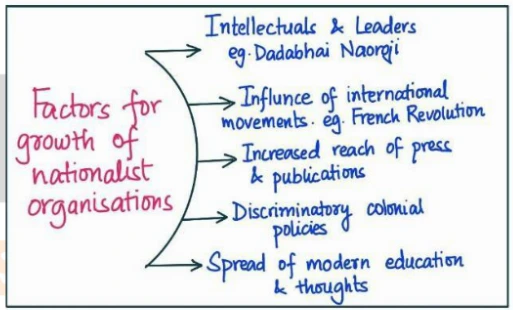Answer:
|
How to approach the question
- Introduction
- Write briefly about the growth of nationalist organizations in British India from 1858 to 1905.
- Body
- Write about the factors contributing to the growth of nationalist organizations in British India from 1858 to 1905.
- Write the impact of nationalist organizations on the freedom movement.
- Conclusion
- Give appropriate conclusion in this regard.
|
Introduction
The period from 1858 to 1905 in British India witnessed the growth of nationalist organizations. They include various political, social, and intellectual groups that emerged during this period with the aim of advocating for Indian rights, national identity, and self-rule.
Body
Key factors that contributed to the growth of nationalist organizations during this period:

- British Colonial Policies: Such as Doctrine of Lapse, racism, imposition of heavy taxation on Indians etc.
- Political, administrative and economic unification of the country with uniform set of laws
- Impact of International Movements: The growth of nationalist organizations in India was influenced by global movements for freedom and democracy, such as the American Revolution and the French Revolution.
- Progressive character of socio-religious movements that removed social evils that divided society. Example- Satya Sodhak Samaj.
- Spread of Education: The spread of modern and progressive education which promoted self-respect among Indians. Example- Setting up of universities in Bombay, Calcutta and Madras in 1857.
- Role of Intellectuals and Leaders: Influential intellectuals and leaders like Dadabhai Naoroji, and Surendranath Banerjee played a significant role in advocating for Indian rights, national identity, and self-rule.
- Influence of Western Thought: Indian intellectuals, educated in the British system, were inspired by Western political philosophies and sought to apply them to the Indian context.
- Role of Press and Publications: Bengal Gazette, Amrita Bazar Patrika, and Kesari became platforms for nationalist leaders to express their views, raise awareness, and mobilise public opinion against British policies.
- Formation of Societies and Associations: Various societies and associations, such as the Indian Association and the Poona Sarvajanik Sabha, were established during this period.
Growth of nationalist organisations during this period shaped the freedom movement in multiple ways:
- Building a National Identity: They sought to create a shared sense of national identity among Indians, emphasising the common historical and cultural heritage of the country.
- International Exposure and Support: Leaders like Dadabhai Naoroji and A.O. Hume represented Indian interests on international platforms and sought to garner. Dadabhai Naoroji established the East India Association. He was also an MP in the British Parliament.
- Start of Constitutional Struggle: Organizations like the Indian National Congress (INC) utilized constitutional methods like petitions, resolutions, and public campaigns to demand reforms and press for self-rule.
- Political Education of People: Nationalist organizations organized public meetings, lectures, and seminars to raise awareness about colonial policies, rights.
- Unity and Collaboration: For instance, INC (1885) emerged as the most prominent political organisation, representing diverse interests and aspirations of Indians.
Conclusion:
Thus, the growth of nationalist organizations in British India from 1858 to 1905 laid the foundation for efforts of extremists’ leaders and subsequently for the Gandhian struggle ultimately leading to India’s independence in 1947.
To get PDF version, Please click on "Print PDF" button.


Latest Comments